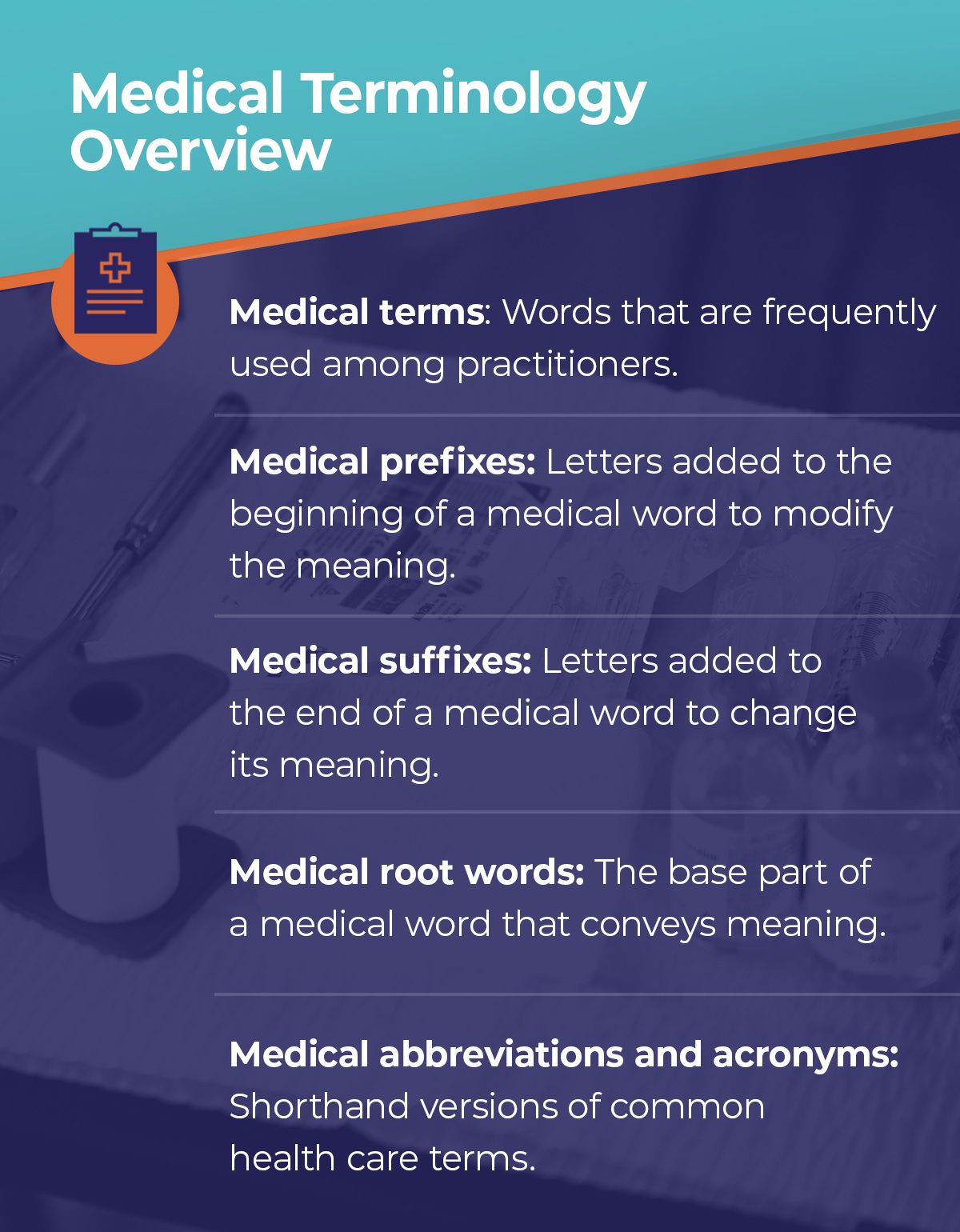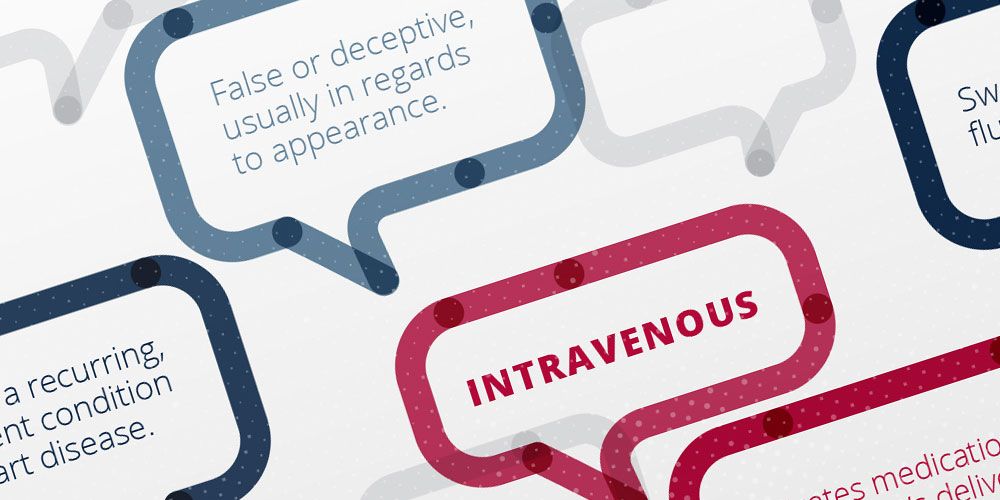While most of us don’t need to understand discipline-specific jargon outside of our own profession, medical terminology is a notable exception. We all need to know what’s going on with our health.
Fans of medical TV shows might already be familiar with some common terms. Even so, rounding out your existing knowledge with some additional medical terms, abbreviations, and acronyms can help you gain an even better handle on what you hear in the health care world. This list can help you get started.
Breaking down common medical terminology
The world of medical terminology is quite vast, so this list is organized by category to make it a little easier to digest. If you’re looking for something in particular, use the links below to jump to the relevant section.
- Medical terms
- Medical prefixes and suffixes
- Medical root words
- Medical abbreviations and acronyms

Medical terms
The charts providers use for making notes are often filled with this kind of medical terminology. You might even know some of them by a different name.
1. Abrasion: A cut or scrape that typically isn’t serious.
2. Abscess: A tender, fluid-filled pocket that forms in tissue, usually due to infection.
3. Acute: Signifies a condition that begins abruptly and is sometimes severe, but the duration is short.
4. Benign: Not cancerous.
5. Biopsy: A small sample of tissue that’s taken for testing.
6. Chronic: Signifies a recurring, persistent condition like heart disease.
7. Contusion: A bruise.
8. Defibrillator: A medical device that uses electric shocks to restore normal heartbeat.
9. Edema: Swelling caused by fluid accumulation.
10. Embolism: An arterial blockage, often caused by a blood clot.
11. Epidermis: The outer layer of the skin.
12. Fracture: Broken bone or cartilage.
13. Gland: An organ or tissue that produces and secretes fluids that serve a specific function.
14. Hypertension: High blood pressure.
15. Inpatient: A patient who requires hospitalization.
16. Intravenous: Indicates medication or fluid that’s delivered by vein.
17. Malignant: Indicates the presence of cancerous cells.
18. Outpatient: A patient who receives care without being admitted to a hospital.
19. Prognosis: The predicated outcome of disease progression and treatment.
20. Relapse: Return of disease or symptoms after a patient has recovered.
21. Sutures: Stitches, which are used to join tissues together as they heal.
22. Transplant: The removal of an organ or tissue from one body that is implanted into another.
23. Vaccine: A substance that stimulates antibody production to provide immunity against disease.
24. Zoonotic disease: A disease that is transmissible from animals to humans.
Medical prefixes and suffixes
Medical terminology follows the same structural rules all language does, including use of prefixes and suffixes. You may be familiar with some of these from words outside the realm of medicine.
25. A-, an-: Lack of or without.
26. -ation: Indicates a process.
27. Dys-: Abnormal, difficult, or painful.
28. -ectomy: Surgical removal of something.
29. -ismus: Indicates a spasm or contraction.
30. -itis: Signifies inflammation.
31. -lysis: Decomposition, destruction, or breaking down.
32. Macro-: Large in size.
33. Melan/o-: Black or dark in color.
34. Micro-: Small in size.
35. -ology: The study of a particular concentration.
36. -osis: Indicates something that is abnormal.
37. -otomy: To cut into.
38. -pathy: Disease or disease process.
39. -plasty: Surgical repair.
40. Poly-: Many.
41. Pseudo-: False or deceptive, usually in regard to appearance.
42. Retro-: Behind or backward.
Medical root words
Some medical root words are intuitive simply based on your experiences. If you’re an athletic person, for example, you probably know cardiovascular exercise is any activity that gets your heart rate pumping.
43. Cardi/o: Related to the heart.
44. Derm/a/o, dermat/o: Pertaining to the skin.
45. Encephal/o: Related to the brain.
46. Gastr/o: Related to the stomach.
47. Hemat/o: Pertaining to blood.
48. My/o: Related to muscle.
49. Oste/o: Related to bone.
50. Pulmon/o: Refers to the lungs.
51. Rhin/o: Related to the nose.
52. Sclerosis: Hard or hardening.
53. Stasis: Slowing or stopping the flow of a bodily fluid.
54. Therm/o: Indicates heat.
Medical abbreviations and acronyms
There are many more medical acronyms and abbreviations than what’s listed below. But unless you’re planning to become a doctor or another type of provider, this condensed lineup should get you up to speed.
55. ALS: Advanced life support.
56. Bl wk: Blood work.
57. BMI: Body mass index, a measure of body fat based on height and weight.
58. BP: Blood pressure.
59. CPR: Cardiopulmonary resuscitation, a life-saving technique that’s also called mouth-to-mouth resuscitation.
60. C-spine: Cervical spine.
62. DNR: Do not resuscitate, a medical order indicating providers should not perform CPR.
63. ED/ER: Emergency department or emergency room.
64. EKG: Electrocardiogram, a way of monitoring the heart and testing for problems.
65. HDL-C: High-density lipoprotein cholesterol, often called “good” cholesterol.
66. HR: Heart rate, expressed as beats per minute.
67. LDL-C: Low-density lipoprotein cholesterol, often called “bad” cholesterol.
68. Lytes: Electrolytes.
69. NICU: Neonatal intensive care unit, a specialized unit that cares for premature infants.
70. OR: Operating room where surgeries are performed.
71. Pre-op: Preoperative.
72. Psych: Refers to psychiatry or the psychiatric ward.
73. PT: Physical therapy, a type of treatment to help patients move and feel better.
74. Rx: Prescription, usually for medication but can also signify another treatment.
75. Stat: Immediately.
What if you don’t see the medical term you’re looking for?
This medical terminology cheat sheet covers a lot of ground, but there will likely be times when you hear something unfamiliar. When you come across a medical term you don’t recognize, be sure to ask for clarity. Patient education is a huge part of a physician’s job. Doctors aim to foster an environment that generates dialogue.
Having thoughtful conversations with your physician is about more than just gaining knowledge. In fact, engaging with your doctor could result in a healthier life. Some evidence shows the most engaged patients tend to have better outcomes. You are your own best advocate.
Advance your knowledge of medical terminology
It’s clear that you can benefit from having these medical terms at your disposal, especially when it comes to speaking one-on-one with your physician. If you don’t happen to have a physician you regularly see, it’s wise to start looking so you can maintain good health.
Learn how you can find the right provider by reading our article “How to Choose a Doctor: What You Should Look for in a Primary Care Physician.”
*This article was originally published in May 2019. It was updated in 2022 to include additional information.


